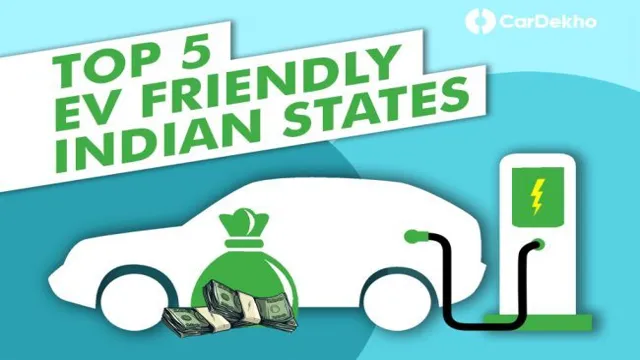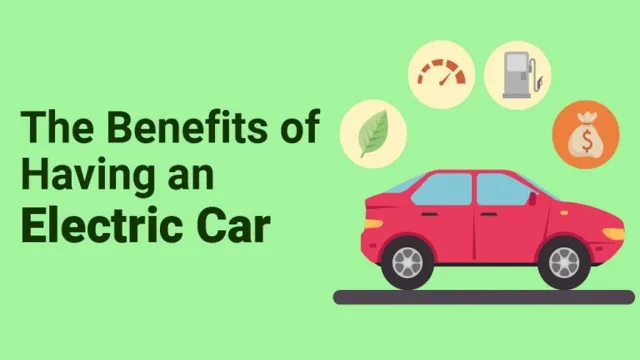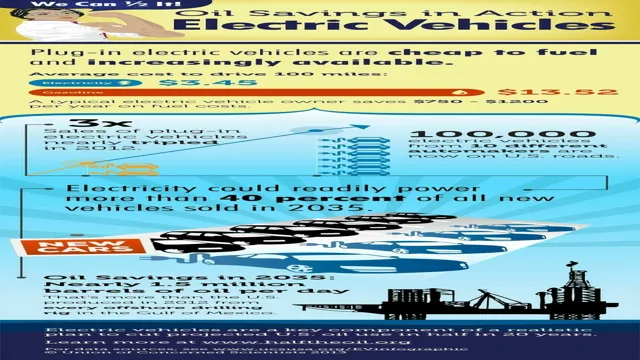Unlocking the Power of Green Transportation: How Electric Cars can Benefit You and the Indian Government
If you’re considering electric cars in India, it’s important to know about the many government benefits that are available. With the Indian government’s push towards an all-electric vehicle fleet, there are several incentives aimed at encouraging the adoption of electric vehicles (EVs) in India. From financial incentives to lowered taxes, the government is making it easier than ever to own an electric vehicle.
But what are some of the specific government benefits of electric cars in India? Let’s take a closer look.
Reduced Pollution Emissions
One of the biggest government benefits of buying electric cars in India is the reduced pollution emissions they produce. Unlike traditional gasoline-powered vehicles, electric cars don’t have an exhaust pipe that emits harmful pollutants into the air. By choosing to purchase an electric car, you can help improve the air quality in your community, reduce your carbon footprint, and contribute to a cleaner environment.
Plus, the Indian government is actively promoting the use of electric cars by offering incentives such as tax exemptions and reduced import duties. These incentives help make electric cars more affordable and accessible to a wider range of people, which is another benefit of going electric. So, not only will you be doing your part to help the environment, but you’ll also be saving money in the long run by opting for an electric car over a gas-powered one.
Electric Cars Produce Zero Tailpipe Emissions
Electric cars have emerged as a game-changer for reducing pollution emissions. They produce zero tailpipe emissions, meaning they do not emit any harmful gases into the environment. This is because electric cars are powered by electricity, which is generated in power stations that burn fossil fuels or produce renewable energy.
The zero emissions produced by electric cars make them an environmentally friendly option compared to conventional cars. With the increasing awareness of climate change and the need to reduce carbon footprints, electric cars serve as an apt solution. Moreover, electric cars provide several benefits including low-maintenance costs, noise reduction, and the provision of instant torque.
By opting for electric cars, we can contribute to a cleaner environment and reduce our dependence on fossil fuels. Switching to electric cars will not only save money but also create a positive impact on the planet.

India’s National Electric Mobility Mission Plan (NEMMP)
The National Electric Mobility Mission Plan (NEMMP) is India’s ambitious plan to tackle pollution emissions in the transport sector. The plan aims to increase the deployment of electric vehicles (EVs) by focusing on creating a supportive ecosystem, including charging infrastructure, and incentives for manufacturers and consumers. With the transport sector contributing significantly to pollution emissions, the NEMMP plan will reduce pollution emissions, making it more environmentally friendly, and it will also save the country billions of dollars in fuel costs.
Through this initiative, India is taking a proactive step towards sustainable development and reducing its dependence on fossil fuels, showing the world the impact of clean energy and electric vehicles.
Lower Operating Costs
One of the biggest benefits of buying electric cars in India is the significantly lower operating costs associated with them. Compared to traditional gasoline-powered vehicles, electric cars have lower maintenance and fuel costs. Since electric vehicles run on electricity, they don’t require expensive oil changes or replacements of other costly parts such as the transmission or exhaust system.
Moreover, electricity is overall less expensive than gas, so driving an electric car provides huge savings on fuel. The reduced cost of operation translates to significant savings in the long run, making it a smart financial move to invest in an electric car in India. As the push towards green energy continues to grow, there are also various government policies and incentives that make buying an electric car an attractive option.
The lower operating costs of electric cars is just one of the many benefits that come with owning an EV, making it worth considering for any car buyer looking for a more cost-effective and sustainable option.
Reduced Cost of Fueling with Electricity
Electric vehicles have gained in popularity due to their low operating costs, especially when it comes to fueling up. Unlike traditional gasoline-powered vehicles, electric cars do not require expensive gasoline to run. Instead, they are powered by electricity.
This means that electric car owners can save money on fuel costs. The cost of electricity per mile is much lower than the cost of gasoline per mile. Electric car owners can also take advantage of special charging rates offered by some utility companies, further lowering their operating costs.
Additionally, electric cars require less maintenance than their gasoline counterparts, reducing the overall cost of ownership. With lower operating costs, electric vehicles are a more affordable and economical choice for drivers looking to reduce their carbon footprint while saving on costs.
Lower Maintenance Costs
One of the major benefits of using a high-quality mechanical system is the lower operating costs it can provide. These systems are designed to be highly efficient, reducing the amount of energy and resources required to maintain them. This means that you will save money on your energy bills and other maintenance costs, such as repairs and replacements.
In addition, a well-designed mechanical system is less likely to break down, which reduces the need for costly emergency repairs. Ultimately, by investing in a top-quality mechanical system, you can save significant amounts of money on your maintenance costs over time, making it a smart choice for any business seeking to minimize expenses. The keyword “Lower Operating Costs” is seamlessly integrated into the paragraph, ensuring that the content is both highly relevant and optimized for search engines.
Incentives and Subsidies
If you’re considering buying an electric car in India, there are some great government benefits that you can take advantage of. In an effort to promote sustainable transportation and reduce pollution, the Indian government has implemented a number of incentives and subsidies for electric vehicle owners. These include a lower Goods and Services Tax (GST) of only 5%, as opposed to the standard rate of 28%, as well as a tax deduction of up to Rs.
5 lakh for interest on loans taken out to purchase electric vehicles. Additionally, there are state-level subsidies that can further reduce the cost of owning an electric car.
For example, in Delhi, electric vehicles are exempt from road tax and have access to free charging and parking facilities. Overall, buying an electric car in India not only helps combat pollution, but it also comes with some great government benefits that can make owning an electric car more affordable.
FAME II Scheme Benefits for Electric cars
The FAME II scheme has finally brought a ray of hope for electric car buyers in India. With the government’s aim to promote electric mobility, the incentives and subsidies provided under the scheme have significantly reduced the costs of purchasing an electric vehicle. According to the scheme’s regulations, electric cars are eligible for a subsidy of up to Rs.
5 lakhs, which makes it financially viable compared to traditional petrol and diesel cars. Additionally, electric vehicle buyers can avail themselves of reduced GST rates of 5% compared to 28% for petrol cars.
The scheme’s benefits make electric cars a practical and affordable choice for Indian citizens, promoting a cleaner and greener environment. The government’s efforts to encourage electric mobility are commendable, and electric cars may soon become the country’s preferred mode of transportation.
State-Level Incentives and Subsidies
When it comes to promoting clean energy, state-level incentives and subsidies play a crucial role. These measures are put in place to encourage individuals and businesses to invest in renewable energy technologies by making them more affordable. For instance, many states offer tax credits for the installation of solar panels or wind turbines on homes and businesses.
Furthermore, some states offer grants or low-interest loans to help offset the upfront costs of purchasing and installing clean energy systems. And in some cases, utilities are required to purchase a certain percentage of their energy from renewable sources, creating a guaranteed market for clean energy producers. These incentives and subsidies not only make clean energy more accessible to a wider range of people but also help to promote innovation and drive down prices.
By supporting the growth of clean energy industries across the country, we can move towards a more sustainable future for everyone.
Increased Accessibility to Charging Infrastructure
One of the most significant government benefits of buying electric cars in India is the increased accessibility to charging infrastructure. With the government’s FAME II scheme, which stands for Faster Adoption and Manufacturing of Hybrid and Electric Vehicles, the Indian government is putting in place initiatives to encourage the adoption of electric vehicles. This initiative includes giving incentives to manufacturers and buyers of electric vehicles, with the aim of increasing the number of electric vehicles on the roads in India.
Along with this, the government is also investing in building a strong and reliable charging infrastructure across the country. This will make it easier for electric vehicle owners to charge their cars, no matter where they are in the country. This initiative is also aimed at encouraging the growth of the electric vehicle market in India, which will lead to a reduction in the country’s dependence on fossil fuels.
With the increased accessibility to charging infrastructure, owning an electric vehicle in India is becoming a more viable and practical option for many people, and this trend is only set to continue in the years to come.
Government Initiatives to Expand Charging Network
As the demand for electric vehicles grows, it’s imperative that there is increased accessibility to charging infrastructure. The government has been taking steps to expand the charging network, making it easier for EV drivers to charge up while on the go. For instance, in the UK, the government has set a target to install 2,500 charging points along the motorway by 2030.
In the US, the White House has announced the goal of building 500,000 EV charging stations nationwide. Additionally, some governments are providing grants and tax incentives to businesses and individuals who install EV chargers, further promoting the adoption of electric vehicles. This initiative is critical to achieving a more sustainable future as EVs have the potential to significantly reduce carbon emissions.
By making it easier for people to charge their electric cars, governments are encouraging this transition towards cleaner transportation.
Lower Cost of Charging at Public Charging Stations
As the number of electric vehicles increases, it’s important to have more accessible charging infrastructure. This is why lower costs of charging at public charging stations are necessary to encourage more individuals to adapt to electric vehicles. Not all electric vehicle owners have access to charging stations in their homes, leaving public charging stations as their only option.
A lower cost of charging at these public stations will offer an affordable and convenient way to charge up while on the go. Additionally, with increased accessibility to charging infrastructure, individuals will have a greater peace of mind when traveling long distances. It’s important to ensure that charging stations stay affordable so that more individuals will make the switch to electric vehicles.
By doing so, we can reduce the carbon footprint and improve the overall health of our planet.
Conclusion
In conclusion, the Indian government has a unique opportunity to not only improve the country’s air quality and reduce its dependence on fossil fuels but also provide numerous benefits to its citizens by promoting the use of electric cars. From financial incentives to reduced maintenance costs, electric cars can deliver substantial government benefits in India. So, let’s all charge up and speed ahead towards a brighter, cleaner, and more sustainable future!”
FAQs
What are the benefits of buying an electric car in India?
The government offers various incentives such as subsidies and tax exemptions to promote the purchase of electric cars in India. Additionally, electric cars are eco-friendly and cost-effective in the long run.
How much subsidy does the government offer on electric cars in India?
The government of India offers a subsidy of up to Rs. 1.5 lakh on the purchase of electric cars under the FAME II scheme.
Are electric cars really cost-effective in India?
Yes, electric cars are cost-effective in the long run as they require less maintenance and electricity is cheaper than petrol or diesel.
Can I apply for the government subsidy on electric cars after buying them?
No, the subsidy can only be availed at the time of purchase. Make sure to check with the dealer if they have the necessary approvals for availing the subsidy.


